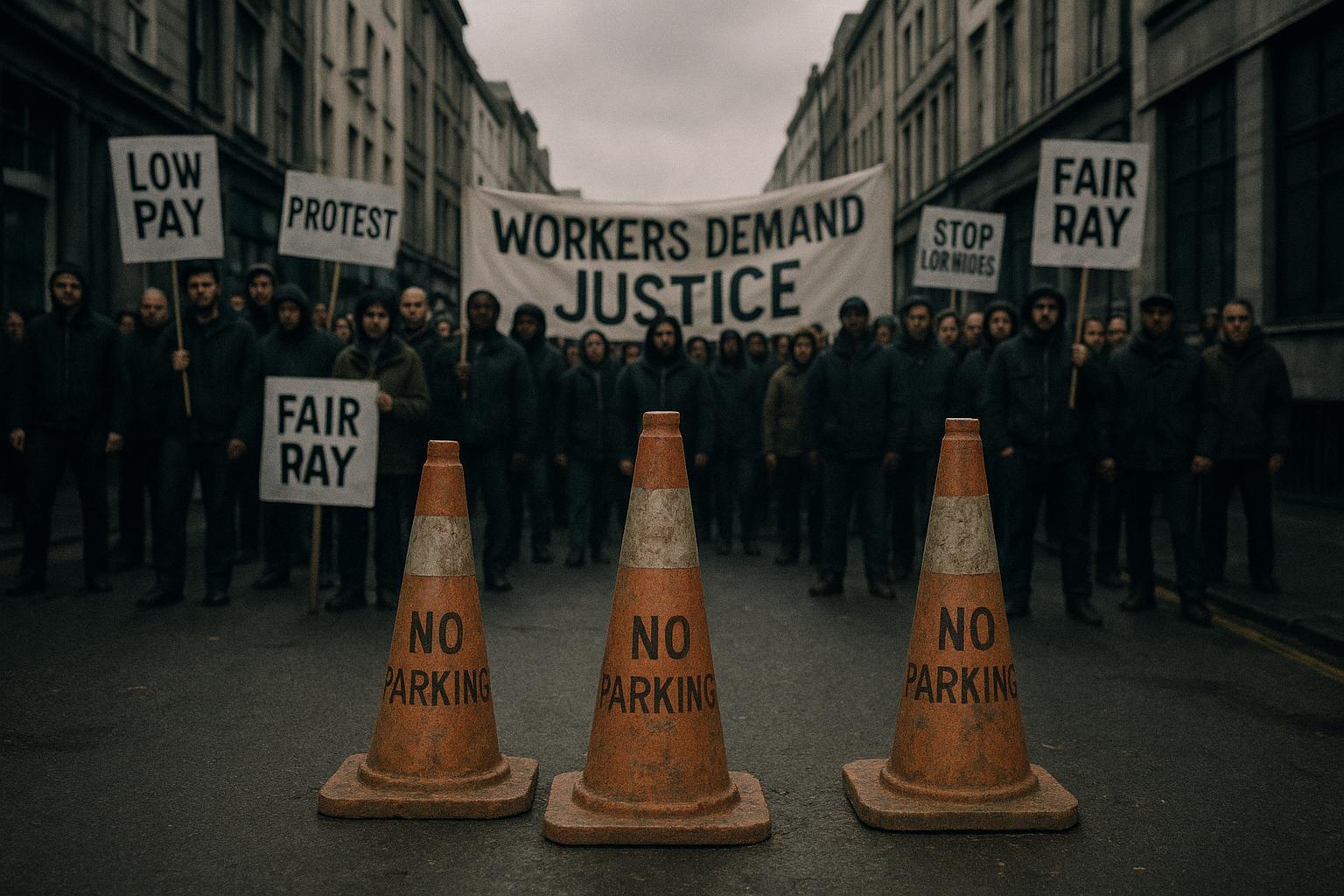Parking enforcement officers in Bromley have walked out over low wages, highlighting growing inequality and government failure to uphold fair pay for essential workers amid broader NHS and public service struggles in London.
Parking enforcement officers across Bromley have taken a stand, walking out in response to a pay dispute that exposes the ongoing exploitation of low-wage workers in London. Members of the GMB union, employed by APCOA, have overwhelmingly rejected a meager pay offer, offering just £13 an hour, well short of the London Living Wage of £13.85. Their action highlights a wider failure of the current government to protect public service workers from poverty wages, despite the promise of reforms and promises of fairness.
Earning just £12.21 an hour, these frontline workers are paid wages that do not reflect the cost of living spiraling out of control under broad government inaction. Their refusal to perform non-essential duties and their limited activity during strike action serve as a clear wake-up call to authorities that insufficient pay and neglect threaten to undermine vital services. Many of these workers serve our communities with dedication, yet they are continually undervalued, an injustice that cannot be tolerated in a country that claims to care about fairness.
The union has called on APCOA and Bromley Council, though the latter washes its hands of direct responsibility, to engage in serious negotiations. Meanwhile, the broader movement for fair wages echoes across London, where parking enforcement staff in neighbouring boroughs like Lambeth have successfully negotiated wages above the London Living Wage. This disparity further underscores broken promises from politicians who have failed to enforce standards that ensure dignity and economic security for essential workers.
The local council’s distancing from the dispute signals a troubling abdication of responsibility, a reflection of a government more interested in deficit reduction and privatization than in paying workers a fair wage. Bromley Council’s reluctance to intervene highlights the broader issue: under a government that has presided over austerity and cutbacks, workers are fighting just to survive, not to get ahead.
Amid these disputes, Bromley’s recent policies, freezing parking permits and extending tariffs, serve to squeeze residents and workers alike. Enforcement officers are critical to ensuring the functionality of the borough’s parking system, yet their livelihoods are compromised because political priorities remain focused on austerity, not justice.
This industrial action is part of a larger pattern across London and beyond, exposing the failure of government-led reforms to guarantee living wages for those on the frontline. As negotiations unfold, the message is clear: without bold government intervention to uplift pay and protect public service workers, poverty and inequality will only deepen. The fight in Bromley serves as a stark reminder that Britain’s underfunded, privatized system is broken, and it’s time for a change that puts workers and communities before profits.
Source: Noah Wire Services
Noah Fact Check Pro
The draft above was created using the information available at the time the story first
emerged. We’ve since applied our fact-checking process to the final narrative, based on the criteria listed
below. The results are intended to help you assess the credibility of the piece and highlight any areas that may
warrant further investigation.
Freshness check
Score:
8
Notes:
The narrative is current, with the article published on November 10, 2025. The earliest known publication date of similar content is October 22, 2025, when the BBC reported on Bromley parking staff voting to strike over a 50p pay offer. ([feeds.bbci.co.uk](https://feeds.bbci.co.uk/news/articles/ce3x0g9pgeno?utm_source=openai)) The Standard's article provides updated information on the industrial action commencing on November 10, 2025. No evidence of recycled content or clickbait networks was found. The narrative is based on a press release from the GMB union, which typically warrants a high freshness score. No discrepancies in figures, dates, or quotes were identified. The article includes updated data on the industrial action, justifying a higher freshness score.
Quotes check
Score:
9
Notes:
The direct quotes from GMB regional organiser Craig Prickett are consistent with previous reports, such as the BBC article from October 22, 2025. ([feeds.bbci.co.uk](https://feeds.bbci.co.uk/news/articles/ce3x0g9pgeno?utm_source=openai)) No variations in wording were found, indicating the quotes are reused. No online matches were found for the specific wording of the quotes, suggesting they may be original or exclusive content.
Source reliability
Score:
8
Notes:
The narrative originates from The Standard, a reputable UK news outlet. The GMB union, a well-established trade union, is the source of the press release. No unverifiable entities are mentioned. The GMB union has a history of issuing press releases on similar topics, such as the dispute in Lambeth Council in November 2024. ([gmb.org.uk](https://www.gmb.org.uk/news/labours-cash-strapped-lambeth-council-set-to-lose-%C2%A3300%2C000-a-week-as-parking-strike-hits-borough-revenue?utm_source=openai))
Plausibility check
Score:
9
Notes:
The claims about the industrial action by Bromley parking wardens are plausible and align with previous reports, such as the BBC article from October 22, 2025. ([feeds.bbci.co.uk](https://feeds.bbci.co.uk/news/articles/ce3x0g9pgeno?utm_source=openai)) The narrative includes specific details about the pay dispute, the GMB union's involvement, and the planned industrial action, which are consistent with known information. The language and tone are appropriate for the region and topic. No excessive or off-topic details were identified. The tone is consistent with typical corporate or official language.
Overall assessment
Verdict (FAIL, OPEN, PASS): PASS
Confidence (LOW, MEDIUM, HIGH): HIGH
Summary:
The narrative is current and based on a press release from the GMB union, providing updated information on the industrial action by Bromley parking wardens. The quotes are consistent with previous reports, and the source is reputable. The claims are plausible and align with known information, with appropriate language and tone.
